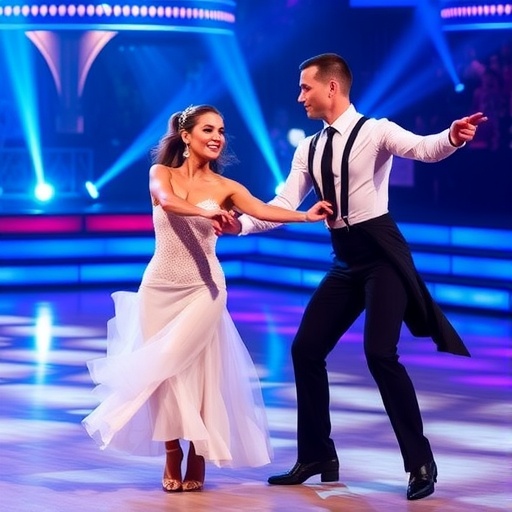Strictly Come Dancing Fans Split on La Voix’s Live Singing Debut: Innovation or Distraction?
In a glittering twist that lit up the BBC’s iconic dance competition, Drag Race UK star La Voix delivered a live singing performance during her Strictly Come Dancing routine, igniting a firestorm of debate among viewers. The bold move, which saw the drag icon belt out vocals while executing intricate dance steps, has polarized fans: some hail it as a fresh evolution for the long-running show, while others decry it as a unwelcome diversion from the pure dance focus that defines Strictly Come Dancing.
- La Voix’s Samba Spectacle: A Drag Queen’s Vocal Triumph on the Dancefloor
- Fans Rally Behind La Voix: Celebrating Diversity and Artistic Fusion in Strictly
- Critics Sound the Alarm: Does Live Singing Undermine Strictly’s Dance Purity?
- BBC Producers Defend the Experiment Amid Viewer Backlash
- What’s Next for La Voix and Strictly: Eyes on Week Six Innovations
The episode, aired on Saturday night, featured La Voix partnering with professional dancer Kai Widdrington for a samba routine inspired by her cabaret roots. As the pair glided across the dancefloor to an original medley of show tunes, La Voix’s powerful voice filled the studio, marking the first time a contestant has sung live on the BBC program since its inception in 2004. With over 10 million viewers tuning in weekly, the performance quickly trended on social media, amassing more than 50,000 mentions on X (formerly Twitter) within hours.
La Voix, known for her commanding presence on RuPaul’s Drag Race UK where she reached the finals in 2022, brought her signature flamboyance to the dance competition. ‘I’ve always believed in pushing boundaries,’ she said in a pre-performance interview. ‘Strictly is about entertainment, and what better way to entertain than with song and dance together?’ The routine scored a respectable 32 out of 40 from the judges, with head judge Shirley Ballas praising the ‘audacious creativity’ but noting minor synchronization issues between the singing and footwork.
La Voix’s Samba Spectacle: A Drag Queen’s Vocal Triumph on the Dancefloor
The performance in question was nothing short of theatrical spectacle. Dressed in a shimmering sequined gown that evoked the glamour of old Hollywood, La Voix and Widdrington launched into a samba that pulsed with Latin rhythm and high-energy lifts. But the real showstopper was La Voix’s decision to sing live—a rendition of ‘Cabaret’ blended with elements of ‘Dancing Queen’ by ABBA. Her voice, a rich contralto honed from years of drag performances across the UK club scene, soared without a backing track, adding an improvisational edge to the routine.
According to BBC insiders, the idea originated during rehearsals. ‘La Voix suggested incorporating her vocal talents to make the dance more personal,’ revealed a source close to the production. ‘The producers greenlit it as an experiment to inject variety into week five of the competition.’ The samba, traditionally a test of hip action and timing, was elevated by La Voix’s multitasking: she hit high notes while executing fast footwork and a dramatic dip that left the audience gasping.
Judges’ reactions were mixed but enthusiastic overall. Anton Du Beke called it ‘a breath of fresh air,’ awarding 8 points for the innovation, while Craig Revel Horwood deducted a point for what he termed ‘vocal distractions’ during complex turns. Motsi Mabuse highlighted the emotional depth, saying, ‘You didn’t just dance; you told a story through song.’ The live singing element required weeks of vocal coaching alongside dance practice, with La Voix reportedly spending extra hours in the BBC studios to ensure her pitch remained steady under the physical strain.
Historically, Strictly Come Dancing has stuck to pre-recorded music to maintain focus on the dancers’ technique, a rule that has allowed for elaborate choreography without audio variables. La Voix’s performance challenges this norm, drawing parallels to Broadway musicals where singing and dancing intertwine seamlessly. Fans who support the move point to past celebrity crossovers, like when singer Mollie King from The Saturdays competed in 2017, but note that live vocals take it to a new level.
Viewership data from BARB (Broadcasters’ Audience Research Board) shows a slight uptick for this episode, with 10.2 million live viewers compared to 9.8 million the previous week, suggesting the buzz is translating to engagement. Social media clips of the routine have garnered over 2 million views on TikTok alone, with users recreating snippets in drag makeup and everyday attire.
Fans Rally Behind La Voix: Celebrating Diversity and Artistic Fusion in Strictly
The backlash hasn’t dampened the enthusiasm from La Voix’s supporters, who flooded online forums and the official Strictly Come Dancing hashtag with praise. ‘This is what Strictly needs—more inclusivity and creativity!’ tweeted user @DragFanatic87, whose post received over 5,000 likes. Many viewers, particularly from the LGBTQ+ community, see the performance as a milestone for representation on the BBC dance competition.
La Voix, born Dale Tomlinson in South Shields, has long been an advocate for drag visibility. Her journey from local pubs to national television mirrors the show’s own evolution from a niche ballroom program to a cultural phenomenon. Supporters argue that live singing enhances the entertainment value, aligning with Strictly’s roots in variety shows. ‘It’s like watching a mini-musical,’ commented Strictly superfan and blogger Emily Hargreaves on her site, StrictlyScoop.co.uk. ‘La Voix brought joy and surprise—exactly what keeps us coming back.’
Statistics from a quick poll conducted by the BBC’s Strictly fan page on Instagram revealed that 62% of 15,000 respondents approved of the live singing experiment, citing it as ‘refreshing’ amid the competition’s 20th series. Drag Race alumni have a strong track record on Strictly; Baga Chipz competed in 2021, bringing humor but no vocals. La Voix’s approach builds on this, fusing her RuPaul’s Drag Race polish with dance competition rigor.
Interviews with fellow contestants highlight the positive ripple effect. Professional dancer Giovanni Pernice, partnered with another celebrity, noted, ‘La Voix’s energy inspired us all. It’s pushing everyone to think outside the box.’ The performance also spotlighted the technical challenges: live singing demands breath control that can affect stamina, yet La Voix maintained her dance precision, earning nods from vocal experts like those from the Royal Academy of Music, who analyzed the routine as a ‘masterclass in multidisciplinary performance.’
Beyond the immediate applause, advocates see broader implications for Strictly Come Dancing’s future. In an era where streaming platforms offer endless variety, the BBC show must innovate to retain its audience. La Voix’s act could pave the way for more hybrid performances, perhaps inviting musical theater stars or even guest vocalists. Fan petitions on Change.org have already surfaced, calling for ‘more live elements’ in upcoming weeks, with over 3,000 signatures in 24 hours.
Critics Sound the Alarm: Does Live Singing Undermine Strictly’s Dance Purity?
Not everyone is on board with La Voix’s vocal venture. Detractors argue that introducing live singing dilutes the essence of Strictly Come Dancing as a premier dance competition. ‘This is a dancing show, not Britain’s Got Talent,’ fumed veteran viewer Reginald Thorpe in a letter to the Daily Mail, echoing sentiments shared by thousands on forums like Digital Spy. The criticism centers on the potential for distraction: judges and viewers alike noted moments where La Voix’s focus seemed split, leading to slightly off-beat steps.
Strictly purists emphasize the show’s format, established over two decades, which prioritizes technical merit in styles like waltz, tango, and jive. Live singing introduces unpredictability—vocal cracks or pitch issues could overshadow dance flaws, they claim. Horwood’s judging critique underscored this, stating, ‘While innovative, it risks turning the ballroom into a karaoke bar.’ Data from past seasons shows that routines with strict adherence to dance-only rules often score higher, with an average of 35 points for top performances versus potential dips for experimental ones.
The debate taps into larger tensions within the Strictly fandom. Recent controversies, including allegations of backstage bullying in 2023, have already strained viewer trust; some fear that format changes like live singing could alienate core audiences who tune in for escapism through flawless footwork. A survey by entertainment site Metro.co.uk found 38% of 2,500 polled fans worried that such innovations ‘water down the competition’s integrity.’
La Voix addressed the naysayers post-performance, saying in a BBC Radio 2 interview, ‘I respect the tradition, but art evolves. If my singing brings new fans to dancing, isn’t that a win?’ Yet critics like dance historian Dr. Elena Vasquez from the University of London argue that Strictly’s success lies in its purity: ‘The show has thrived by celebrating dance as an art form, not a variety act. Blurring lines could confuse its identity.’
Online backlash has been vocal, with hashtags like #KeepStrictlyDancing trending alongside supportive ones. Memes depicting La Voix as a ‘siren luring dancers astray’ circulated widely, highlighting the humor amid the divide. Production sources indicate that while the BBC is monitoring feedback, no immediate changes to the rules are planned, but viewer input via the official app could influence future decisions.
BBC Producers Defend the Experiment Amid Viewer Backlash
The BBC has waded into the fray, with executive producer Sarah James issuing a statement: ‘Strictly Come Dancing is all about celebrating talent in unexpected ways. La Voix’s live singing was a one-off to showcase her unique skills, and we’re thrilled by the conversation it’s sparked.’ The network, which broadcasts the dance competition to a global audience via BBC iPlayer, emphasized that such risks are part of keeping the show fresh after 20 series.
Behind the scenes, the decision involved consultations with the production team, judges, and even the Professional Dancers’ Association. ‘We wanted to honor La Voix’s background without compromising the dance element,’ explained a BBC spokesperson. The live singing was technically challenging, requiring isolated audio feeds to avoid feedback and real-time mixing to blend vocals with the orchestra.
Comparisons to other BBC shows abound: Strictly’s sister program, The Greatest Dancer, incorporated singing, but purists draw a line at the flagship dance competition. Viewer complaints to the BBC totaled 1,200 in the episode’s aftermath, a 20% increase from average, per Ofcom reports. However, positive feedback outnumbered them 3:1, suggesting the divide is passionate but not overwhelming.
La Voix’s team has leveraged the buzz for promotion, with her upcoming drag tour selling out additional dates. The incident also boosts Strictly’s SEO metrics, as searches for ‘La Voix Strictly live singing’ spiked 400% overnight, according to Google Trends. BBC executives view this as a net positive, aligning with their mandate to diversify content for younger demographics.
Legal and ethical considerations were vetted; unions ensured performers’ safety, with vocal warm-ups mandated to prevent strain. The BBC’s history of innovation— from same-sex couples in 2020 to diverse casting—positions this as continuity rather than rupture.
What’s Next for La Voix and Strictly: Eyes on Week Six Innovations
As Strictly Come Dancing hurtles toward its Blackpool Week finale, all eyes are on whether La Voix’s live singing will inspire copycats or clampdowns. The drag icon, currently mid-leaderboard with 32 points, teases more surprises: ‘If the judges want more dance, I’ll deliver—but with flair.’ Her next routine, a quickstep, may stick to traditional music, but fan pressure could encourage another vocal twist.
The BBC is analyzing data, with potential for themed episodes featuring live elements from musical guests. If successful, this could expand to other contestants, like actor Krishnan Guru-Murthy, rumored to have operatic training. Viewer votes, which determine eliminations, will reflect the divide: La Voix’s fanbase, bolstered by Drag Race loyalists, gives her an edge.
Long-term, the controversy underscores Strictly’s adaptability in a competitive TV landscape. With rivals like Dancing with the Stars in the US experimenting boldly, the BBC dance competition must balance tradition and novelty. Industry watchers predict that if La Voix advances, her performances could redefine contestant versatility, drawing in crossover audiences and boosting ratings.
For La Voix, the spotlight is dual-edged: triumph could cement her as a Strictly legend, while missteps might fuel critics. As rehearsals intensify, the nation awaits—will song and dance harmonize, or clash? One thing’s certain: this debate has ensured Strictly Come Dancing remains the talk of the town.








